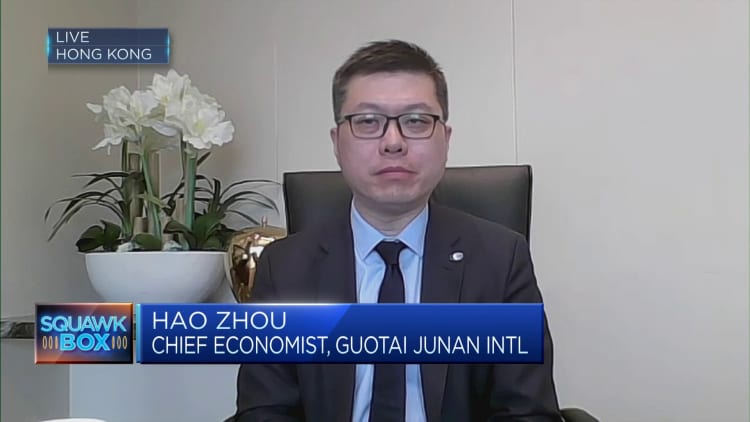When Eunice Wang landed a job as a strategic consultant at a pharmaceutical company in Beijing, a dream came true.
The dream was six years in the making: she graduated from university with a degree in bioengineering and later completed a master’s degree in business analytics in the US.
But the 25-year-old quit after just three months.
“I thought I could stay for a whole year, but I thought, wow, I’d rather kill myself. I’m really hopeless,” she said.
Ms. Wang returned to her hometown in northern China six months ago to work as a barista. This shift from white-collar work to “light physical work” (“light physical labor” in Chinese) is gaining popularity among young Chinese.
A lot of young people may be disappointed in their jobs because companies don’t hire them for a job, they hire you to operate a computer at a desk.
Jia Miao
Assistant Professor, NYU Shanghai
translated tags “My first manual labor experience” With 30.3 million views on the social media platform Xiaohongshu, some users described their new job as “no thinking”.
Those jobs included working as a manager, waiter and cleaner at a fast-food restaurant — doing nothing but sitting in an office.
“There are a lot of discussions online where young people share how they escaped white-collar jobs because they were dissatisfied,” said Jia Miao, an assistant professor of sociology at NYU Shanghai.
Wu Xiaogang, a sociology professor at the same university, added: “This is very unusual. If you have a university degree, you should be a white-collar worker.”
A paper co-authored by Wu estimates that at least a quarter of China’s college graduates are underemployed — on top of record high youth unemployment. Underemployment is when people are employed in jobs that do not reflect their skills or training.

“It is undeniable that after Covid-19, although China’s economy is recovering … it is really difficult for many young people to find a job. Some of them choose to find a light job to try to support themselves,” Miao said.
That’s not the case, however, for younger workers like Wang, who are taking what CNBC experts call “voluntary exit” tech jobs.
The “dehumanization” of workers
Ms Wang imagines her office work as a consultant will be “very creative” and looks forward to working with colleagues and leaders. But she says the reality is far from that.
“Because of the workload, I don’t have time to communicate with anyone,” she said.
Instead, she spends most of her time drawing slides, writing reports in Mandarin and translating them into English—jobs Wu describes as clerical work requiring “little intellectual challenges.”
You have no sense of self, even if you have some sort of professional cachet.
Wu Xiaogang
Professor of Sociology, New York University
Wu said more and more college graduates are becoming “little white collars” – the Chinese equivalent of “little white collars”.
Miao added that “small” refers not only to the age of the workers, but also to their roles—often junior roles that require little decision-making or personal input. However, she added that this “dehumanization” of workers is not new.
“As our society moves from agriculture to industrialization, from farms to factories, work doesn’t require creativity or autonomy. You need to do the same thing repeatedly in a specific position,” she said.
It felt like if I didn’t get a “real job” everything I’d been doing would be meaningless. I was terribly afraid that I would fail.
“As our economy becomes more established and established, the same thing is happening … a lot of young people may be disappointed in their jobs because companies are not hiring them to work, they are hiring you to operate at a desk computer”
“You don’t have a sense of self, even if you have some sort of professional cachet,” Wu added.
‘Great change’ in work values
Even so, young people like Wang continue to struggle to meet the traditional expectations of going to university and landing a “good” decent office job.
“I’ve been told that if you sacrifice your personal time, if you put in a lot of effort and stay up all night — eventually you’ll be elite, you’ll be admirable,” she said.
“It felt like if I didn’t get a ‘real job’, everything I’d done would be meaningless. I was so terrified that I was going to fail.”
In recent years, young professionals around the world have been questioning the meaning of work, such as Quiet Quit and Minimal Mondays are gaining popularity.

In China, however, there is a “Tang Ping” phenomenon, where young people reject the overworked culture and embrace “flat lying”.
Miao said the rapid transformation of China’s economy was causing “huge changes” in work values.
“For the older generation, they worked under the planned economy … combine work with patriotism so that your job is to contribute to a new socialist country,” she said.
“But now, because we’ve built up a certain GDP and economic base … young people want to feel individualistic. They don’t believe their ultimate goal is to contribute to the country.”

Only in hindsight did Wang realize that she “personally” never wanted to pursue a major or work in a white-collar job.
“I look back and I realize it was because my parents told me to choose it, and people told me that with this major, I would have a very, very good future,” Wang said.
“But I never thought about whether the job was for me – it looked good on my resume, but would I like the job?”
A new definition of success?
For white-collar workers, Wu said, the allure of “light work” is “more freedom and flexibility” in working hours — at the expense of job security and lower incomes.
“I wouldn’t encourage everyone to quit their jobs to do this… I sometimes reflect on my own privilege, how can I pursue this because my parents are middle class and I don’t have to worry about financial issues,” Wang added .
Her white-collar job earns about 12,000 yuan ($1,700) a month. She earns a quarter of her income as a barista and receives “a little” financial support from her parents.
But what may be invaluable to her is the self-discovery Wang said she was able to experience after leaving her white-collar job.
People might say, it took you so long to finish your masters and you end up with coffee? A job that can be done after graduating from junior high school and elementary school?
“Some people will say, you took a long time to take the master’s degree exam, and you ended up making coffee? A job that anyone who graduated from junior high school and primary school can do?” she said.
“The traditional Chinese idea is: If you don’t go to university, if you don’t work hard to apply for jobs, you’ll end up as a waiter, a street cleaner.”
But Wang said she came to realize that these jobs were not as simple as many people thought. For example, being a barista not only taught her the art of brewing coffee, it also helped her overcome her fear of approaching people.
“In the past, I would really be self-centered and not think about (blue-collar workers) anymore,” she added.

“But actually these jobs can also be decent – why are some jobs considered inferior to others?”
Wang said she is now satisfied with her work in a way she couldn’t find in her previous job, whether it was through latte art or seeing satisfied customers.
“It’s funny to say, but it makes me happy to go to work now,” she laughs.
“I’m really sad (leaving my office job) because I’ve really tried to fit into the mold over the years. But I don’t think I’ll ever be the person society wants me to be.”
— CNBC’s Ulrica Lin contributed to this report.


